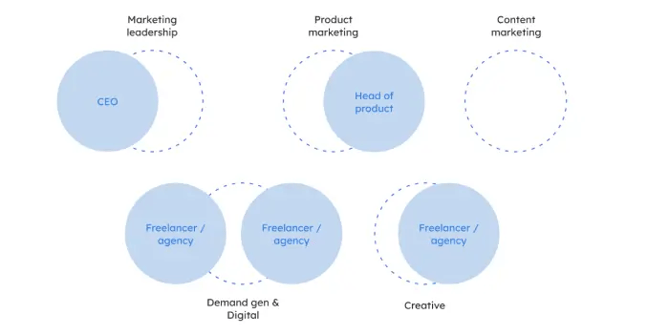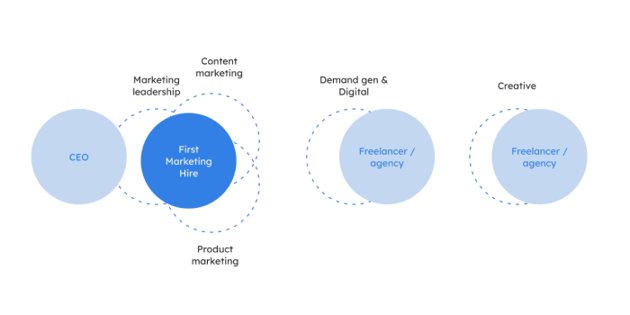Scaling Your SaaS Startup: When and How to Bring in a Specialized SaaS Marketing Agency
Struggling to scale your SaaS startup? Discover when to hire a B2B SaaS marketing agency, how to choose the right one, and build a successful...

Mike Northfield
One of the questions we hear most often is: “How do I build and structure my B2B SaaS marketing team?”
As your SaaS company grows, so do the demands on your marketing function. In the early days, the CEO or founder often wears multiple hats, taking on marketing responsibilities while leaning on freelancers or agencies to fill specific gaps. But as your business evolves, this patchwork approach starts to limit your ability to scale effectively.
To sustain and accelerate growth, your marketing team must transition from a reactive, ad-hoc operation to a well-oiled machine. This requires more than just adding headcount—you’ll need to build a strategic, scalable structure that aligns with your company’s goals and growth stage.
At some point, the leadership team needs to graduate from the day-to-day execution and build an in-house marketing function.
In this guide, we’ll break down exactly how to make that transition, laying the groundwork for a marketing team that not only meets your current needs but sets you up for long-term success.
Building a high-performing SaaS marketing team is about aligning roles, skills, and goals with your company’s growth stage and unique challenges. Before you start hiring, it’s essential to evaluate your current state and map out the capabilities you’ll need to grow sustainably.
Here are a few critical considerations to keep in mind:
Are you focused on generating leads, building brand awareness, or launching a new product? Your immediate and long-term objectives will dictate the roles and skillsets your marketing team needs to succeed.
For example, a company targeting aggressive ARR growth might prioritize demand generation and product marketing, while one in the early validation stage might need a generalist with strong messaging and content skills.
Before you start hiring, take stock of what’s already working. Are there freelancers, agencies, or team members handling marketing tasks?
Identifying gaps and overlaps will help you decide where to invest first. If you’re using external agencies, consider whether their efforts align with your broader strategy or if bringing those capabilities in-house would drive better results.
Instead of jumping to specific job titles, think about the primary marketing functions you need: leadership, product marketing, content creation, demand generation, and creative.
This approach ensures your hires are flexible and can adapt as your needs evolve.
Your marketing team doesn’t operate in a vacuum. Strong collaboration with sales and product teams is critical to aligning messaging, driving qualified pipeline growth, and improving customer acquisition efficiency.
Before building your team, evaluate how well these functions are currently integrated and identify areas for improvement.
Investing in a marketing team is a big step, so it’s essential to budget not just for salaries but also for tools, training, and campaign expenses. Aim to strike the right balance between hiring full-time team members and leveraging external support to maximize your return on investment.
By starting with these considerations, you’ll ensure your marketing team is set up for success.
Below is a more detailed breakdown of the skill groups including an outline of responsibilities for each role. Remember that this is not a hard-and-fast list but a starting point to help you think about the skills you need for each area of the marketing function.
Considering the marketing team structure early in the hiring process is crucial to ensure a well-rounded and effective team, especially in adapting quickly to market changes and evolving customer needs.
.webp?width=600&height=300&name=Frame%201%20(2).webp)
At the heart of a strong marketing team lies strategy. These roles ensure the marketing team aligns with broader business objectives, providing a clear direction and ensuring all efforts are measurable and impactful.
Marketing management is the strategic glue holding the team together, ensuring every effort contributes to measurable outcomes and business growth.
Product marketing bridges the gap between what your product offers and what your audience needs, ensuring your messaging lands with precision and clarity.
Executional roles bring strategy to life, ensuring campaigns resonate with target audiences and generate measurable results.
High-quality content doesn’t just inform—it builds trust, generates leads, and equips sales teams with the tools they need to close deals.
Demand generation ensures your campaigns are ROI-focused, maximizing visibility while driving a steady pipeline of qualified leads.
Creative ensures your brand stands out in a competitive SaaS landscape, delivering an experience that’s as memorable as it is professional.
Each role within your B2B SaaS marketing team is interconnected. Marketing management sets the vision, product marketing ensures your product shines, and executional roles bring everything to life with precision. Together, these functions form a cohesive team capable of adapting to market changes, scaling effectively, and driving business results.
It’s difficult to answer – and, in true consultant fashion, we usually say “it depends”.
Rather than hire for a certain title, think about equipping your team with the right skill groups.
Some teams may need more of one skill group than another – some won’t need any of certain skills. “It depends”. Consider this list a starting point for your marketing team recruitment.
As your B2B SaaS company grows, your marketing team should evolve to align with your business stage and priorities. Here’s how to structure your team at each phase:
At this phase, marketing is led by the CEO or founder, supported by generalists and external partners. The focus is on validating your positioning, generating leads, and establishing foundational assets.
Your Marketing team should look like this:
With product-market fit achieved, scaling efforts require specialists to drive demand, create compelling content, and enable sales.
Some key roles are:
At this stage, the marketing function must optimize efficiency, expand into new markets, and maximize LTV.
Your marketing team should look like this:
For more insights into aligning marketing leadership with your business stage, check out this blog on the 4 Lifecycle Stages of the SaaS CMO.
We often work with highly-engaged CEOs or founders who get their hands dirty with the “Big M” (strategic) marketing. Sometimes they take ownership of tactical delivery as well. In early stages, a CEO's involvement in Big M marketing is a good thing. In many cases, a CEO should play a role in defining and leading a company's strategic narrative and deciding the big bets.
The head of product usually plays a role in product marketing. And more often than not, the demand generation and creative functions are filled by a collection of SEO/SEM/PPC/designer/developer agencies or freelancers.
That leaves a lot of early-stage SaaS company “marketing teams” looking like this:
The CEO, Head of product, and freelancers can fill some of the roles initially. But freelancers and agencies don't usually speak with each other, follow a unified strategy, or move in the same direction. The executive team can't fulfill the entire marketing function since it's not their primary focus.
Content marketing is often ignored or outsourced. Many early-stage companies treat content marketing as an afterthought. People see it as an enigma or a waste of time, and it can be difficult to do without deep industry expertise and discipline. But leaving content on the back burner is a big mistake – but that's for another article.

You can move away from the mushy marketing team modeled above by bringing some of the marketing responsibilities in-house. This also frees up your leadership team to focus on progressing the other business functions as a whole.
The main goals of hiring your first full-time marketing team member are to:
If you’ve received funding or have a steep growth trajectory, hiring three or four single-discipline marketers is a valid option. But this usually isn’t the easiest because you still need someone you trust to manage their performance. And that person should have at least some hands-on experience in each functional area.
For most companies, it’s realistic to afford one full-time marketer as you start to scale. As a first hire, someone with the following traits will help you achieve the three goals above:
With someone like the above, your marketing function might look more like this:

From here, you can hire a more experienced marketing leader to to own the team building and strategic responsibilities. Or – depending on your first marketing hire’s experience (and your timing) – they may be the right person to step into a leadership role and build a team of specialists under them as you scale.
It's crucial for the first marketing team leader to have a solid grasp of marketing strategies, guiding the team with a well-rounded understanding of both 'Big M' marketing strategies and hands-on tactical execution.
This ensures the marketing team continuously tests and refines strategies, structuring around key functions like content marketing, product marketing, and acquisition marketing to achieve the company's marketing and business objectives.
Building a successful B2B SaaS marketing team isn’t without its hurdles. From deciding where to begin to identify the right leaders, the process can feel overwhelming, especially if marketing isn’t your primary area of expertise.
Below, we’ve addressed some common pain points faced by SaaS founders and executives—and how to overcome them effectively.
"I'm still not quite sure where to start..."
Even with this framework, you may find it difficult to understand which marketing skill groups your company needs first. It's often challenging for CEOs that don't have deep marketing experience to know what to look for in their first marketing hire.
If you're having trouble getting started, it might be worth exploring a short-term fractional marketing leader or coach, who can help assess your situation and make recommendations for next steps based on their experience. Or, here's another in-depth article on how to hire a B2B SaaS CMO.
"I have a full-time marketer, but they're not very experienced with the "Big M" side of marketing – I don't have the capacity or marketing experience to coach them up"
If you already have a marketing team member, but they're not quite ready to step into the leadership role, a 6-month B2B SaaS go to market strategy framework with short-term coaching from a marketing leader might give them the right tools to get up to speed quickly.
"I'm looking for a full-time marketing leader... What questions do I need to ask to make sure they know their stuff?
While this article is aimed at finding a more seasoned marketing leader – these questions can help you benchmark a mid-level marketing leader.
Whether you’re struggling to take the first step or fine-tune your existing team, remember that building a high-performing SaaS marketing team is a gradual process. Prioritize hiring for skill groups that align with your growth stage, invest in leadership development, and don’t be afraid to seek external expertise when needed.
By addressing these challenges head-on, you’ll lay the foundation for a marketing team that doesn’t just execute but drives meaningful results for your business.
Here are some resources that may interest you:
Building a high-performing marketing team is only the beginning.
Measuring its impact is where the real work begins. For B2B SaaS companies, performance evaluation hinges on identifying and tracking the right metrics—those that tie marketing efforts directly to business outcomes like revenue growth, customer retention, and efficiency.
Below are the essential metrics you should monitor to ensure your SaaS marketing team is delivering value and driving results:
MQLs are prospects who have engaged with your marketing efforts and demonstrated interest, making them more likely to convert into customers. This metric reflects how effectively your team is generating interest and nurturing leads.
A steady stream of high-quality MQLs indicates that your content, campaigns, and outreach strategies are resonating with your audience.
Volume is important, but quality is critical. Are your MQLs aligning with your ICP (Ideal Customer Profile), and are they moving through the funnel at expected rates?
CAC measures the total cost of acquiring a new customer, including spend on ads, content, tools, and salaries.
Keeping CAC in check is essential for profitability, especially for subscription-based models where returns accumulate over time.
CAC should decrease as your marketing engine matures. Balance spend between high-cost paid channels and lower-cost inbound methods to optimize this metric.
LTV is the total revenue a customer generates over their lifecycle with your company. It’s closely tied to retention and upselling efforts.
A higher LTV ensures your customers are staying longer and spending more, maximizing the return on your acquisition efforts.
Aim for an LTV that’s at least 3x your CAC. If this ratio is off, revisit customer retention strategies or pricing models.
LVR tracks the month-over-month growth in the number of qualified leads entering your pipeline.
A growing pipeline of qualified leads indicates your marketing efforts are scaling effectively.
Sudden drops in LVR could signal misalignment between marketing and sales or inefficiencies in lead generation strategies.
Pipeline contribution measures the percentage of revenue pipeline directly attributable to marketing efforts, including content, campaigns, and digital channels.
This metric shows how integral your marketing team is to overall sales success.
High pipeline contribution reflects strong alignment between marketing and sales. If this is low, revisit your lead nurturing strategies or sales enablement materials.
Churn rate is the percentage of customers who cancel their subscription or do not renew within a given time period.
High churn rates can erode ARR (Annual Recurring Revenue) faster than new customer acquisition can replace it.
If churn is high, work with the customer success team to identify gaps in onboarding, product adoption, or communication.
This measures the revenue generated for every dollar spent on marketing.
It’s the ultimate indicator of whether your marketing efforts are cost-effective and contributing to the bottom line.
A declining ROI may suggest inefficiencies in campaigns or channels. Reallocate spend to high-performing activities.
Track the performance of your content, including blog views, time spent on page, downloads, and click-through rates (CTR).
Engaged prospects are more likely to convert into MQLs and eventually paying customers.
Low engagement might indicate a mismatch between content topics and audience needs or an issue with distribution channels.
Measure conversion rates at each stage of the funnel, from visitor to lead, lead to MQL, MQL to SQL, and SQL to closed deal.
This provides a clear view of where prospects are dropping off and helps diagnose bottlenecks.
Focus on improving the weakest stage of the funnel to maximize overall efficiency.
Monitor total website traffic, the percentage from organic search, and how each channel contributes to lead generation.
Website traffic is often the first touchpoint for potential customers. Understanding where your traffic and leads come from can help optimize spend.
High bounce rates or low organic traffic might signal the need for an SEO overhaul or better content alignment.
Building a high-performing SaaS marketing team can be complex, but you don’t have to navigate it alone. At Kalungi, we specialize in helping B2B SaaS companies like yours create marketing teams that drive real growth. Our proven frameworks and hands-on expertise can guide you every step of the way.
Book your free discovery call today and let Kalungi help you unlock the full potential of your SaaS marketing team.
1. What should be the first steps when building my core B2B SaaS marketing team and function?
In the early stages, it's common for the CEO or founder to take on marketing responsibilities while hiring specialists or agencies to fill gaps. It’s best to focus on establishing the marketing foundation including go-to-market strategy, positioning, messaging, and content for different funnel stages. Additionally, set up a demand generation machine, marketing automation, and a solid sales/marketing cadence.
2. When should a company consider transitioning to an in-house marketing function?
After you’ve laid the foundation for your marketing function and are getting more aggressive with your growth goals, it’s time to start building your ideal in-house team. This usually happens when the company has developed a clear go-to-market strategy, defined its positioning, and established basic marketing processes.
3. What are the primary skill groups a B2B SaaS marketing team should have?
The five skill groups you’ll need on your marketing team are leadership, product marketing, content marketing, demand generation/digital, and creative. Each of these skill groups plays a crucial role in driving different aspects of the marketing function, from strategy development to execution and analysis. While not all of your team members will individually represent all of these qualities, you should see them generally represented across your entire team.
4. How should a company prioritize hiring for its marketing team?
Instead of hiring based solely on titles, focus on equipping the team with the right skill groups. Prioritize hiring individuals who possess the necessary skills and experience to effectively fill each of the five core marketing skill groups. Consider the current needs of your marketing function as well as your growth stage.
5. What traits should a company look for in its first SaaS marketing team leader?
The first marketing team leader should ideally have mid-level experience, be “T-shaped,” have specific industry experience, and demonstrate serious leadership potential. They need to be capable of reducing the burden of marketing that’s on the CEO, and integrating marketing efforts across the organization.
6. What additional assistance can companies seek when building their marketing team?
Companies can consider hiring a short-term fractional marketing leader or coach for guidance, especially if they're unsure where to start. For existing, fully-fleshed in-house that is looking for strategy and guidance, a B2B SaaS go-to-market strategy workshop, playbook, or framework with coaching can be super helpful as well.
Struggling to scale your SaaS startup? Discover when to hire a B2B SaaS marketing agency, how to choose the right one, and build a successful...

Discover 4 advanced growth strategies to scale your B2B SaaS business in 2025. Learn how to optimize your SaaS marketing efforts for success.

Expand your SaaS business confidently with our B2B SaaS Go-to-Market Checklist. Discover strategies, insights, and tips for successful market entry.
